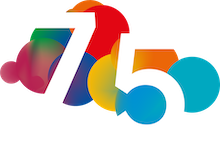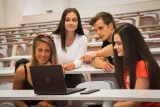Educational events held in previous years of the mentoring programme
Unlock the Secrets of Effective Communication in Science!
Are you a PhD student in the midst of data collection or manuscript drafting? Join our exclusive, hands-on workshop led by Dr. Carlos V. Melo from Charles University, and master the art of scientific storytelling.
Date: June 7, 2024
Time: 9:00 AM – 6:00 PM (8 hours of learning)
Venue: Rectorate Building, Meeting Room, 4th Floor
Agenda Highlights:
- Module 1: Master the art of scientific storytelling with practical lessons.
- Principles of effective communication in scientific writing.
- A step-by-step approach to writing a scientific paper: from figures to title.
- Module 2: Collaborate and create in group activities, dissecting and reconstructing sections of a scientific paper.
- Module 3: Hone your skills with an individual writing assignment, followed by personalized feedback.
Additional Benefits:
- Access to post-workshop resources and reading lists.
- Opportunities for continuing education online.
The workshop will be held in English. Course capacity is limited to 12 aspiring scientists. Participants of the mentoring program have the option of priority registration.
We look forward to you!

Two librarians will try to guide you through the process of publishing an article. From journal selection, through tools to simplify writing, formatting, citation, and proofreading, towards submission for peer review and acceptance.
But the mission doesn't end with the published article. Want to show it off and get it on ResearchGate? You can. Want to report it in OBD? You must. We'll show you how to handle different versions of your article.
Also look forward to decoding ciphers like decile, quartile, token, ORCID, OBD, APC, hybrid, gold, WoS, FORD, and AIS.
Date: 4th June 2024 , 9-12 AM
Venue: Rectorate Building, Meeting Room, 4th Floor
Lecturers: Blanka Jankovská, Veronika Kolínová
Content:
1. (Anti)plagiarism and referencing
3. Tools for writing and proofreading academic texts in English (SciFlow, Grammarly, Writefull)
1. Basic citation analysis (citation databases, metrics, and R&D evaluation)
2. Open Access (OA types, APC, predators)
3. Identifiers
4. Reporting of publication activity at UPCE (OBD)
The workshop will be held in English.
We look forward to you!
Registration Form:

Maximize your potential and join us for an enlightening session where you can tackle your challenges related to time management and prioritization.
Time and Priority Management Workshop
Date: 27th May 2024, 1:00 PM – 4:00 PM
Venue: VO Building, Room 01009
Lecturer: Jitka Hloušková
You will get an opportunity to explore various practical strategies and tools to navigate your priorities effectively. In a safe and collaborative environment, you will delve deeper into your circumstances and needs while engaging in interactive discussions and group activities to share experiences and exchange ideas. At the end of the workshop, you will be equipped with the confidence to apply your newly acquired skills in both academic and professional life.
The workshop is designed for Ph.D. students, research, and academic staff. It will be held in English.
Course capacity is limited to 20 attendees.
Participants of the mentoring program have the option of priority registration.
We look forward to you!
Registration Form:

Enhance Your Teaching with AI
Discover the transformative power of artificial intelligence in education at the upcoming workshop
Effectively Using Generative AI Tools for Educational Purposes
Date: 30th April 2024 , 9-11 AM
Venue: Rectorate Building, Meeting Room, 4th Floor
Lecturer: Tolga Kargin, PhD (Usak University, Türkiye)
This hands-on workshop will guide you through the innovative process of using generative AI tools to develop compelling educational content. You’ll learn how to:
- Utilize AI to create diverse and engaging learning materials
- Tailor AI-generated content to fit various educational needs
- Enhance the learning experience for your students with cutting-edge AI applications
The workshop is suitable for Ph.D. students and academic staff.
The workshop will be held in English.
Course capacity is limited. Participants of the mentoring program have the option of priority registration.
We look forward to you!
Registration Form:

We would like to invite you to visit the demo-meeting of the PARDUBICE ENTHUSIASTS TOASTMASTERS INTERNATIONAL CLUB presented in cooperation with the mentoring program of the University of Pardubice.
Date: Monday 4 March 2024, 6:00 – 8:00 p.m.
Venue: CB/room 01033 – Čs. legií square 565, Pardubice
Do you want
- to improve your communication and public speaking skills,
- to give better presentations,
- to be confident in presenting your ideas,
- to comfortably give and get constructive feedback,
- to successfully guide teams and conduct meetings,
- to hone your leadership and management skills?
Whether you’re a student, professional, stay-at-home parent, or senior, Toastmasters International might help you to improve your communication skills. You’ll learn how to organize and present your ideas and to attract an attention of your listeners. Toastmasters education program will help you to gain the skills and confidence you need to effectively express yourself in many situations, and to manage situations in different working and everyday settings.
We are looking forward to meeting you there!
Registration form:

Pardubice Enthusiasts Toastmasters Club is the first Toastmasters club in the Czech Republic, founded in 1998. Club members meet every Monday at 6:00 to 8:00 pm in the European Club House - Evropský spolkový dům, Pernštýnské náměstí 54, Pardubice. Guests are welcome to join any meeting.
By active participation, club members practise public speaking and leadership skills in a friendly and supportive atmosphere of the club. The activities and education program are executed in English (every Monday), or in German (every other Thursday), but gained skills can be used in a workplace and everyday life in any language environment.
For more information, visit the Club website: https://pardubice.toastmastersclubs.org.
To learn more about the world wide net of clubs of the non-profit organization Toastmasters International visit the web page https://www.toastmasters.org.
Participant will be introduced to possible innovation routes, broader context of IP Protection, start-up companies and enterpreneurial skill sets.
SPEAKERS:
08/11/22 02.00 pm - 03.30 pm
Karel Buchta // Start-up Business Strategy and Market Validation
23/11/22 02.00 pm - 03.30 pm
Přemysl Rubeš // Start-up financing, building a company and raising from investors
Czech academics and researchers are increasingly expected to publish in international English language journals that have a high impact factor. Writing in English can present many challenges, and apart from the grammar, there are also big differences in the way that texts are structured and formulated. This means that even a text that has been proofread and is grammatically correct, can still be difficult to read and understand for an audience of an English journal.
English writing is generally reader-centred, while Czech writing is topic-centred. Some of the ways in which texts differ include the construction of thesis/argument, overall structure, the rhetorical (writing) style, and sentence structure. Interestingly, Czech authors also show less self-confidence in their writing than English authors, which may affect their likelihood of being published in English.
The workshop will cover the general differences between the Czech style of writing and the English style of writing. We will look at real-life examples of English writing by Czech authors, and participants will have the opportunity to rework a short extract from a Czech writing style into a more English style.
Proposed date:
19 January 2023, 09:00-12:00
maximum capacity of participants – 25
place of realization: DB / 02011
Language level: B2
Presenter: MPhil. Zaan Bester
Sources
Čmejrková, S. 1996. Academic writing in Czech and English. In E. Ventola, & A. Mauranen (eds.). Academic writing, intercultural and textual issues. Amsterdam: John Benjamins. pp. 137-152.
Dontcheva-Navrátilová, O. 2013. Authorial presence in academic discourse: functions of author-reference pronouns. Linguistica Pragensia, 1: 9-30.
Jirsová, M. 2006. Comparison of Czech and English speakers’ use of English intersentential connectives in geographic articles. Master’s thesis. Prague: Charles University.
Kozubíková Šandova, J. 2017. “… And our study might therefore have been slightly underpowered”: A cross-linguistic analysis of hedging in English and Czech medical research articles. Acta Universitatis Carolinae: Philologica, 1: 115-130.
Martin, P., Rey-Rocha, J., Burgess, S. & Moreno, A.I. 2014. Publishing research in English-language journals: Attitudes, strategies and difficulties of multilingual scholars of medicine. Journal of English for Academic Purposes, 16: 57-67.
Martín-Martín, P. 2006. Scientific writing: A universal or a culture-specific type of discourse? Revista de Lenguas para Fines Específicos, 11 & 12: 191-204.
Medin, D. & Bang, M. 2014. The cultural side of science communication. PNAS, 111(4):13621-13626.
Raušová, V. 2016. “Hedging” in academic discourse: linguistic research articles. Master’s thesis. Prague: Charles University.
Zaan short bio
Zaan Bester has lectured and worked in the fields of Academic Writing, English for Specific Purposes, and Academic Literacy Testing for the past 20 years. Her academic interests include Intercultural Communication, Writing for Publication in English, material design for teaching, and staff development. Having been at Stellenbosch University near Cape Town, South Africa, for two decades, she decided to embark on a new professional challenge at the University of Pardubice in September 2018, where she now works for the University‘s Language Centre and the Promotion Department. In addition to teaching English to students of economics, chemistry, and electrical engineering, she is also co-creator of the Let’s Communicate video series, which aims to teach English terms to staff, students, and the community through short, practical and light-hearted scenarios.
Researchers must follow professional practices in line with ethical values to ensure scientific integrity. However, as they face mounting pressure to publish and increasing competition for funding, some ultimately resort to strategies ranging from questionable to clearly unethical, including data fabrication.
Yet, despite well-intentioned efforts to promote scientific integrity, through occasional seminars and workshops, undergraduate and graduate programs remain focused on hard skills, lacking content on research ethics. Conversely, by learning scientific integrity during their formative years, young scientists and early career researchers can identify pitfalls while developing their emotional intelligence and their critical thinking and problem-solving skills towards fostering healthy working environments through a mentorship approach to academic supervision.
Moreover, research misconduct hinders scientific progress and undermines trust in science by fueling conspiracy theories, sparking the alarming rise in science denialism. Now, more than ever, science education requires integrative learning.
date: will be specified
from to: will be specified
the capacity of the workshop is not limited
the room will be specified according to the number of registered before the event
lecturer: Carlos H. V. Melo, Ph.D.
Assistant Professor and In-house Editor at Charles University & Scientific Consultant and Founder of Scientific Consulting Experts.
PhD in Neuroscience, international doctorate program, with over 10 years experience in a wide range of life sciences fields and methods, acquired at International Academic and Research Institutions, including Stanford University, The Salk Institute and Novartis (GNF).


